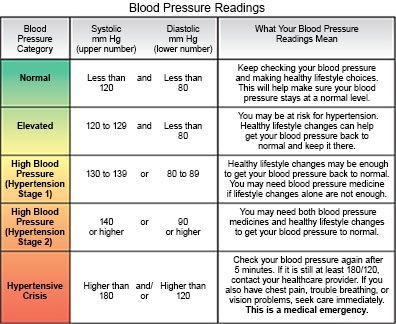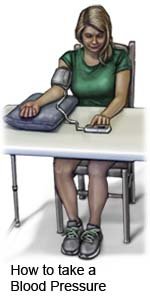Hypertensive Crisis
Medically reviewed by Drugs.com. Last updated on Apr 6, 2025.
What is a hypertensive crisis?
A hypertensive crisis is a sudden spike in blood pressure to 180/120 or higher. A normal blood pressure is 119/79 or lower. A hypertensive crisis is also known as acute hypertension. This is a medical emergency that could lead to organ damage or be life-threatening.
 |
What increases my risk for a hypertensive crisis?
- Not taking your blood pressure medicine as directed
- Hypertension caused by pregnancy (preeclampsia, eclampsia)
- Thyroid disease, kidney or adrenal disease, heart disease, or stroke
- Cocaine or amphetamine use
- Cigarette smoking or alcohol abuse
- Burns, head injuries, surgery, or trauma
What are the signs and symptoms of a hypertensive crisis?
- Blurred vision or headache
- Nausea or vomiting
- Shortness of breath or chest pain
- Dizziness or weakness
- Problems with thinking or behavior changes, such as sleepiness, forgetfulness, or confusion
How is a hypertensive crisis diagnosed?
Your healthcare provider will ask if you have health conditions, such as high blood pressure, diabetes, or heart disease. He or she will ask what your symptoms are and if you have ever had surgery. Tell him or her what medicines you take and if you have ever used illegal drugs. Your healthcare provider will check your blood pressure on both arms and listen to your heart and lungs. He or she will examine your eyes closely and also test your strength, balance, reflexes, and memory. The following tests may be done to check for damage to your heart, brain, and kidneys:
- Blood or urine tests are done to find out if your liver and kidneys are functioning properly. High blood pressure can damage your kidneys.
- An EKG is used to monitor your heart. Sticky pads placed on your skin record your heart's electrical activity.
- X-ray or CT pictures may show signs of a stroke, heart failure, or fluid around your heart and lungs. You may be given contrast liquid before a CT scan to help healthcare providers see the pictures better. Tell the healthcare provider if you have ever had an allergic reaction to contrast liquid.
How is a hypertensive crisis treated?
Treatment depends on the cause of your hypertensive crisis. Healthcare providers will lower your blood pressure and try to prevent organ damage. You may need the following:
- Blood pressure medicine is given to lower your blood pressure. There are many different types of blood pressure medicine, and you may need more than one type. It is very important to take your blood pressure medicine exactly as directed. Skipped doses can lead to a hypertensive crisis. Talk to your healthcare provider if you are having side effects from your medicine. Do not stop taking it without talking to your healthcare provider.
- Diuretics help decrease extra fluid that collects in your blood vessels. This lowers your blood pressure by reducing pressure in your arteries. Diuretics are often called water pills. You may urinate more often while you take this medicine.
Treatment options
The following list of medications are related to or used in the treatment of this condition.
Drugs used to treat this and similar conditions
Benicar
Benicar is used to treat high blood pressure (hypertension). Learn about side effects, interactions ...
Cozaar
Cozaar (losartan) is used to treat high blood pressure (hypertension). Includes Cozaar side ...
Ozempic
Learn about Ozempic (semaglutide) for type 2 diabetes treatment, weight management, cardiovascular ...
Toprol-XL
Toprol-XL (metoprolol) is a beta-blocker used to treat angina and high blood pressure. Includes ...
Spironolactone
Spironolactone is a potassium-sparing diuretic that is primarily used to treat heart failure, high ...
Valsartan
Valsartan is an angiotensin II receptor blocker (ARB) that may be used to treat high blood pressure ...
Hydrochlorothiazide/lisinopril
Hydrochlorothiazide/lisinopril systemic is used for heart failure, high blood pressure
Diovan
Diovan is used to treat high blood pressure (hypertension) or heart failure. Learn about side ...
Carvedilol
Carvedilol (Coreg) is used to treat heart failure and hypertension (high blood pressure). Includes ...
Furosemide
Furosemide is a loop diuretic used to treat fluid retention and high blood pressure by increasing ...
What are the risks of a hypertensive crisis?
Even with treatment, you are at risk for a heart attack, stroke, or kidney damage. You could develop a bulge or tear in the wall of your aorta (the artery that supplies blood throughout your body). Fluid could collect in your lungs and make it hard for you to breathe. You are at risk for blindness, eye damage, seizures, as well as brain damage.
How can I help prevent another hypertensive crisis?
- Check your blood pressure at home. Sit and rest for 5 minutes before you take your blood pressure. Extend your arm and support it on a flat surface. Your arm should be at the same level as your heart. Follow the directions that came with your blood pressure monitor. If possible, take at least 2 blood pressure readings each time. Take your blood pressure at least twice a day at the same times each day, such as morning and evening. Keep a record of your readings and bring it to your follow-up visits. Ask your healthcare provider what your blood pressure should be.

- Manage any other health conditions you have. Health conditions such as diabetes can increase your risk for hypertension. Follow your healthcare provider's instructions and take all your medicines as directed.
- Ask about all medicines. Certain medicines can increase your blood pressure. Examples include oral birth control pills, decongestants, herbal supplements, and NSAIDs, such as ibuprofen. Your healthcare provider can tell you which medicines are safe for you to take. This includes prescription and over-the-counter medicines.
- Limit sodium (salt) as directed. Too much sodium can affect your fluid balance. Check labels to find low-sodium or no-salt-added foods. Some low-sodium foods use potassium salts for flavor. Too much potassium can also cause health problems. Your healthcare provider will tell you how much sodium and potassium are safe for you to have in a day. He or she may recommend that you limit sodium to 2,300 mg a day.

- Follow the meal plan recommended by your healthcare provider. A dietitian or your provider can give you more information on low-sodium plans or the DASH (Dietary Approaches to Stop Hypertension) eating plan. The DASH plan is low in sodium, unhealthy fats, and total fat. It is high in potassium, calcium, and fiber.

- Exercise to maintain a healthy weight. Exercise at least 30 minutes per day, on most days of the week. This will help decrease your blood pressure. Ask your healthcare provider about the best exercise plan for you.

- Decrease stress. This may help lower your blood pressure. Learn ways to relax, such as deep breathing or listening to music.
- Limit alcohol as directed. Alcohol can increase your blood pressure. A drink of alcohol is 12 ounces of beer, 5 ounces of wine, or 1½ ounces of liquor.
- Do not smoke. Nicotine and other chemicals in cigarettes and cigars can increase your blood pressure and also cause lung damage. Ask your healthcare provider for information if you currently smoke and need help to quit. E-cigarettes or smokeless tobacco still contain nicotine. Talk to your healthcare provider before you use these products.
Where can I find support and more information?
- American Heart Association
7272 Greenville Avenue
Dallas , TX 75231-4596
Phone: 1- 800 - 242-8721
Web Address: http://www.heart.org
Call 911 for any of the following:
- You have chest pain.
- You have back pain or shortness of breath.
- You have weakness or numbness in your face, arms, or legs.
- You cannot see or talk as well as usual.
When should I seek immediate care?
- You have a severe headache.
When should I contact my healthcare provider?
- Your blood pressure is 180/110 or higher but you have no other symptoms.
- You have questions or concerns about your condition or care.
Care Agreement
You have the right to help plan your care. Learn about your health condition and how it may be treated. Discuss treatment options with your healthcare providers to decide what care you want to receive. You always have the right to refuse treatment. The above information is an educational aid only. It is not intended as medical advice for individual conditions or treatments. Talk to your doctor, nurse or pharmacist before following any medical regimen to see if it is safe and effective for you.© Copyright Merative 2025 Information is for End User's use only and may not be sold, redistributed or otherwise used for commercial purposes.
Learn more about Hypertensive Crisis
- Do blood pressure drugs interact with alcohol?
- FDA-Approved Weight Loss Drugs: Can They Help You?
- Which Drugs Cause Weight Gain?
Treatment options
- Medications for High Blood Pressure
- Medications for Hypertensive Congestive Heart Failure
- Medications for Hypertensive Encephalopathy
- Medications for Hypertensive Heart Disease
- Medications for Hypertensive Heart with CHF and Renal Disease
- Medications for Hypertensive Heart without CHF and Renal Disease
- Medications for Renovascular Hypertension
Care guides
Symptoms and treatments
Medicine.com guides (external)
Further information
Always consult your healthcare provider to ensure the information displayed on this page applies to your personal circumstances.
